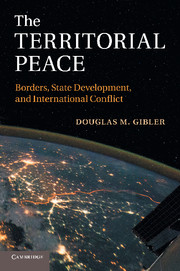Book contents
- Frontmatter
- Contents
- List of illustrations
- List of tables
- Acknowledgments
- 1 Introduction
- PART I INTERNATIONAL BORDERS
- PART II STATE DEVELOPMENT
- 4 Territorial threats and political behavior
- 5 Territorial threats, standing armies, and state repression
- 6 Territorial threats and domestic institutions
- PART III THE TERRITORIAL PEACE
- References
- Index
4 - Territorial threats and political behavior
from PART II - STATE DEVELOPMENT
Published online by Cambridge University Press: 05 October 2012
- Frontmatter
- Contents
- List of illustrations
- List of tables
- Acknowledgments
- 1 Introduction
- PART I INTERNATIONAL BORDERS
- PART II STATE DEVELOPMENT
- 4 Territorial threats and political behavior
- 5 Territorial threats, standing armies, and state repression
- 6 Territorial threats and domestic institutions
- PART III THE TERRITORIAL PEACE
- References
- Index
Summary
Introduction
The first part of the territorial peace argument concerns the salience of territorial issues for the indvidual. It is probably strange to consider centralization in the context of political behavior – can individuals “centralize” an opinion? But in many respects, that is exactly what happens. As I argued in the last chapter, territory is important for the individual, and threats to land trigger unifying, often nationalistic, responses among targeted groups. The effects of this shift in opinion have several attendant consequences. In this chapter, I explore one such consequence in detail: the level of tolerance individuals have for others in their society.
Political tolerance is of course a central component of democracy. Toleration provides protection for the individual, encourages the individual's freedom, and makes political compromises possible. This is why there has traditionally been an empirical connection between an increased level of political tolerance in society and democratic governance. Nevertheless, toleration of those whom the individual distrusts is much easier when the individual's life and livelihood are not threatened. When serious threats to the state persist, individuals centralize into groups and become intolerant of those in minority groups who are unable or unwilling to unify under the protection of the state. Unified majorities cannot tolerate groups who are somehow different from the rest of the populace when the state is targeted.
This argument is a natural outgrowth of the theories of territorial conflict I discussed in Chapters 2 and 3.
- Type
- Chapter
- Information
- The Territorial PeaceBorders, State Development, and International Conflict, pp. 49 - 68Publisher: Cambridge University PressPrint publication year: 2012



